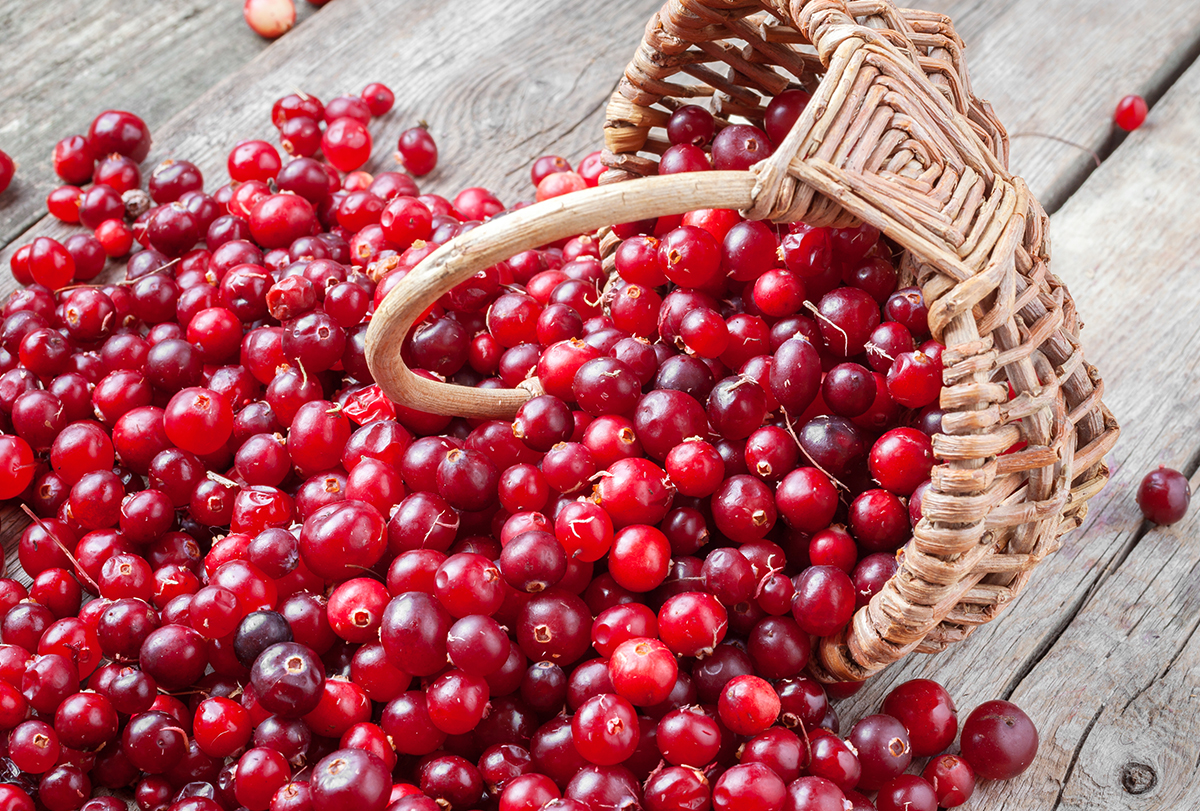In this article:
Over the years, cranberries have become synonymous with the holiday season, with most people consuming the largest amounts of fresh or canned cranberry sauce in jelly or whole berry form during the Thanksgiving and Christmas holidays.

There’s more to cranberries than just being the all-star ingredient for your quintessential Thanksgiving spread.
Origin of Cranberries
The origin of cranberries dates back to the 1950s when they were first used by the Native Americans as a staple food.
The natives diluted the tanginess of the berries with maple sugar or honey and ate them fresh, ground, or mashed with cornmeal, baked into bread, or mixed with wild game and melted fat to form pemmican, a survival ration for the winter months.
Later in 1620, when the Pilgrims landed on American shores, they too were introduced to the culinary tradition of using cranberries by the Native Americans. It was only in 1683 that the early settlers extracted these succulent berries to come up with “cranberry juice,” a product that has endured to this day.
Historically, cranberry has been known and utilized for more than just its culinary worth. The Native Americans, for instance, brewed cranberry poultices to draw poison from arrow wounds, used it for making a soothing cup of tea to calm nerves, and used the juice as a dye for fabrics.
Moreover, American whalers and mariners trusted the medicinal potential of these berries to prevent scurvy and therefore carried them along on their various expeditions.
Advantages of Adding Cranberries to Your Diet
Here are 10 health benefits of cranberries.
1. Prevents urinary tract infections (UTIs)

Scientific studies have found that cranberry juice can be effective in preventing UTIs, especially for women with recurrent infections. (1)
Cranberries contain a high-molecular-weight compound known as proanthocyanidin with anti-adherence properties that prevent fimbriated Escherichia coli bacteria from adhering to the uroepithelial cells in the urinary tract. (1)
To prevent the recurrence of UTIs, drink a glass of unsweetened cranberry juice daily.
2. Fights oral problems
Cranberries also boost oral health and help prevent dental problems such as gingivitis, gum disease, cavities, and plaque buildup.
According to a 2010 study published in the Canadian Dental Association, the polyphenols in cranberries have potential benefits for dental caries and periodontal disease. These potential anticaries agents inhibit the production of organic acids and the formation of biofilms by cariogenic bacteria on the gums and teeth. (2)
In addition, the high vitamin C content in cranberries helps fight gum disease and infections.
Drink ½ glass of unsweetened cranberry juice daily to help prevent bacterial accumulation on your teeth and gums. (3)
3. Improves cardiovascular health

Cranberries help lower the risk of heart-related problems and sustain cardiovascular health.
According to a 2010 study published in Nutrition Reviews, cranberries are a rich source of flavanols, vitamins, and fiber, which may help reduce the risk of cardiovascular disease. (4)
The phytochemicals in these berries help increase the resistance of low-density lipoproteins (LDL or “bad” cholesterol) to oxidation, (5) inhibiting platelet aggregation and reducing blood pressure and other antithrombotic and anti-inflammatory mechanisms.
Another study indicates that consuming flavonoid-rich foods such as cranberries helps decrease the risk of atherosclerosis, which is a precursor for a number of severe cardiovascular problems. Thus, in effect, these berries can just as well help stave off the risk of heart attacks and strokes. (6)
Try boiling fresh cranberries and adding a touch of honey for sweetness. This recipe makes for a delectable cranberry “jam” that you can enjoy daily.
4. Prevents peptic ulcers
Cranberries are also an effective treatment for peptic ulcers, the open sores in the lining of the stomach, esophagus, or duodenum caused by a type of bacteria called Helicobacter pylori. (7)
According to a 2005 study conducted by Chinese researchers, regular consumption of cranberry juice can suppress H. pylori infections in endemically afflicted populations. (8)
The natural antibacterial properties in cranberries help inhibit the growth of H. pylori bacteria and reduce the risk of developing stomach ulcers in the future. (7)
Those who are at a higher risk of developing peptic ulcers must regularly drink cranberry juice to suppress the infection.
5. Aids in digestion

According to the University of Kentucky’s Department of Internal Medicine and Nutritional Sciences Program, a high-fiber diet lowers the risks for indigestion and certain gastrointestinal diseases. (9)
Cranberries are a rich source of fiber and hence promote digestive health. The fiber gives bulk to the stool and facilitates quicker elimination of waste products from the gut. This helps prevent constipation. (10)
In addition, the anti-inflammatory benefits of cranberries reduce the risk of chronic inflammation in the stomach and large intestine. (11)
Eat cranberries raw to get the best results for your digestion.
6. Strengthens your bones
Cranberries are a good source of calcium that helps strengthen your bones, teeth, and nails. They also reduce the risk of developing osteoporosis. (12)
The fruit is a good source of vitamin K, another important vitamin for overall bone health. Vitamin K helps retain calcium in the bone matrix, gives the bones higher resilience, and prevents bone density loss. This, in turn, reduces the risk of fractures. (13)
One cup of raw cranberries or a glass of cranberry juice daily can play a key role in keeping your bones healthy and strong.
7. Boosts immunity

Cranberries have immune-supporting benefits. They are high in vitamin C, a powerful vitamin that helps boost immune system function. In addition, the phytochemicals in cranberries promote a healthy immune system. (14)
People with a strong immune system are less prone to contracting the common cold, flu, and other such common infections.
Drink a glass of cranberry juice a day to fortify your body’s natural defense system and reduce the chance of becoming sick.
8. Fights aging
Cranberries are touted for being among the most antioxidant-rich foods out there.
Enriched with potent phytochemicals such as vitamin C, B3, and B5, cranberries can help delay the appearance of skin aging by combating free radical damage. The oxidative stress caused by free radicals is the single most culpable factor for wrinkles, fine lines, and other forms of cellular damage.
The antioxidant effect of cranberries can also safeguard the skin from damage caused by environmental factors, such as sun-induced UV rays.
Additionally, regular consumption of cranberries can delay the degeneration of brain cells, skin cells, and even organ tissue. Thus, they are helpful in delaying age-related memory loss and motor function decline. (15)
Include cranberries in your diet to avoid problems that develop with age, such as skin aging, memory loss, and lack of coordination.
9. Improves skin health

For beautiful and glowing skin, you can use a simple homemade cranberry face mask.
The enzymes in this fruit exfoliate dead skin and prevent clogged pores. Plus, cranberry juice acts as an effective skin toner, which is especially compatible with oily skin.
The vitamin C in cranberries helps make skin firm and radiant by increasing the production of collagen and elastin, two proteins that work as building blocks for cellular regeneration.
It also prevents wrinkles, redness, hyperpigmentation, and fine lines, thus allowing you to retain your youthful charm for long. (16)
How to use:
- Mix equal amounts of cranberry juice and honey.
- Rub the mixture gently on your face.
- Leave it on for 15 to 20 minutes.
- Rinse it off with lukewarm water thereafter.
This solution works as a toner and helps treat acne and pimples.
10. Reduces the risk of cancer
In a 2012 study published in Anticancer Agents in Medicinal Chemistry, cranberries were found to be a promising natural source of potential anticancer agents.
The study brought to light the positive antiproliferative effects of cranberry extracts against breast, ovarian, prostate, liver, colon, and oral cancers, which essentially means that this mighty ingredient helps slow down the growth of cancer cells. (17)
Chronic excessive oxidative stress and chronic excessive inflammation are the two most common causes that increase the risk of cancer. (18) The cancer-related benefits of cranberries can be attributed to their antioxidant, anti-inflammatory, and antiproliferative properties.
However, one should bear in mind that the inclusion of cranberries in a healthy balanced diet is proposed primarily as an adjunctive step towards cancer prevention and should not be misconstrued as a standalone treatment for a disease as severe as this.
Note:
- Cranberries retain their maximum amount of nutrients and maximum taste when eaten fresh. Cooking destroys its nutritional properties.
- Unsweetened cranberry juice tastes slightly sour, but for medicinal purposes, this juice is the best. You can dilute 2 ounces of cranberry juice with 8 ounces of water.
Nutritional Content of Cranberries
Besides being tasty, cranberries are also healthy, due to their high nutritional profile and antioxidant, anti-inflammatory, and cancer-preventing properties. (19)
They contain vitamins C, K, B6, and E, along with calcium, magnesium, iron, manganese, phosphorus, potassium, and zinc. (20)
Nutritional value of raw cranberries per 100 grams:
| Nutrient | Quantity | Amount |
|---|---|---|
| Water | g | 87.32 |
| Energy | kcal | 46 |
| Protein | g | 0.46 |
| Total lipid | g | 0.13 |
| Carbohydrate | g | 11.97 |
| Fiber | g | 3.6 |
| Sugars | g | 4.27 |
| Calcium, Ca | mg | 8 |
| Iron, Fe | mg | 0.23 |
| Magnesium, Mg | mg | 6 |
| Phosphorus, P | mg | 11 |
| Potassium, K | mg | 80 |
| Sodium, Na | mg | 2 |
| Vitamin C | mg | 14 |
| Niacin | mg | 0.101 |
| Vitamin B6 | mg | 0.057 |
| Folate, DFE | mcg | 1 |
| Vitamin A | mcg | 3 |
| Vitamin E | mg | 1.32 |
| Vitamin K | mcg | 5 |
Cranberries are low in calories, containing over 80% water and 10% carbohydrates. They also contain dietary fiber, protein, salicylic acid, flavonoids, anthocyanins, and triterpenoids. (20)
Preferred Uses of Cranberries
You can incorporate cranberries into your diet by eating them raw or in juice form.
You can also add these berries to muffins, yogurt, or salads. If fresh cranberries are not available, you can consider getting your fill through a supplement, but only after checking with your doctor.
Precautions With Cranberries

- Even though oral consumption of cranberry is generally considered safe for most people, drinking large quantities of cranberry juice can trigger some side effects such as mild stomach upset and diarrhea.
- Both cranberry juice and cranberry extracts have high oxalate content, which is a prime kidney stone-forming chemical. If your cranberry juice consumption exceeds 1 liter per day for a long period of time, you may become increasingly susceptible to developing kidney stones. (21)
- People with an active allergy to aspirin are advised against drinking excessive amounts of cranberry juice because it contains significant amounts of salicylic acid, which is akin to aspirin. (22)
- Avoid high intake of cranberries if you’re taking blood-thinning medicine, such as aspirin.
- People with atrophic gastritis are advised to keep their cranberry juice consumption in check as it is known to increase the absorption of vitamin B12 in their body, which might have detrimental side effects.
- Given that a number of cranberry juice products are sweetened with extra sugar, they can be harmful to people with diabetes.
Final Word
Hailing from the heather family, which includes the likes of blueberries, bilberries, and lingonberries, cranberries are packed with fiber and several vital nutrients such as iron, calcium, potassium, minerals, B vitamins, and vitamin C.
What makes cranberries even more remarkable is the fact that they outrank almost every other fruit and berries in terms of antioxidant content, while being comparatively low in sugar and calories.
Perhaps the only downside that often deters people from adding fresh cranberries to their regular diet is the fact that they are super-tart, much sourer than other familiar berries.
A more palatable and popular alternative is cranberry juice, which is sweetened and blended with other fruit juices to cut down the sharpness of taste. You can also use a wide array of cranberry-based products, such as sauces, dried cranberries, and powders and extracts used in supplements.
Thus, there is absolutely no reason why you should deny yourself the multiple health benefits attributed to these tangy delights.
- Was this article helpful?
- YES, THANKS!NOT REALLY


